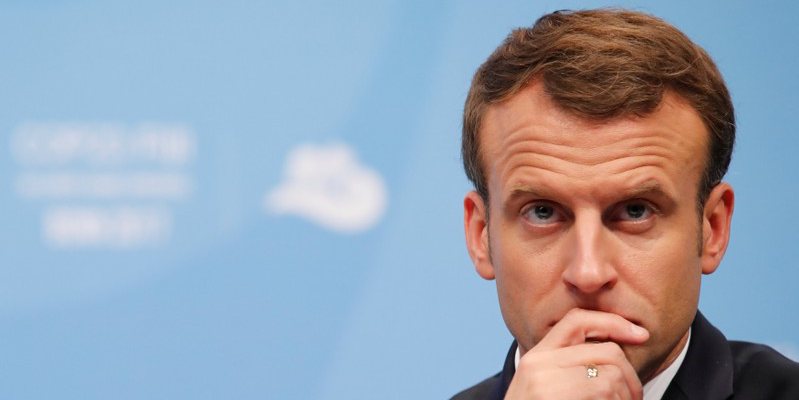- French president Emmanuel Macron made a bold call for a new, stronger Europe as a counterbalance to the nationalism of the US and the dictatorship of China.
- “There is a crisis of contemporary capitalism,” he said. “In the global process, capitalism has become a capitalism of superstars, the spreading of value [to those lower down the ladder] is no longer equitable.”
- “Unless we’re very careful … Schumpeter is going to start looking like Darwin.”
- He also made some jokes at the expense of Donald Trump.
DAVOS, Switzerland – French president Emmanuel Macron was greeted like a rock star at the World Economic Forum in Davos on Wednesday, after he sketched a vision of a new, stronger, more united Europe that stands in contrast to both the US and China as a beacon of globalisation and fairness.
He also dropped a couple of jokes about Donald Trump.
When he finished speaking after 90 minutes – in both French and English – much of the audience gave him a standing ovation. Then they mobbed him for selfies at the foot of the stage. Observers included Bank of England governor Mark Carney, IMF chief Christine Lagarde, former US secretary of state John Kerry, and Publicis boss Maurice Levy.
The French politician began by noting that it was ironic that the billionaires and politicians in Davos were “talking about globalisation in a place almost completely cut off from the rest of the world by snow.” (Davos was inundated by several feet of snow right before the conference, making access to the village even worse than it usually is.)
"It could be hard to believe in global warming," Macron said. "Fortunately you didn't invite anybody skeptical of global warming this year."
That line got a laugh as it was obviously aimed at US President Trump, who is expected at the conference in two days' time to deliver his own keynote speech.
"Globalisation is going through a major crisis," Macron argued, referencing the nationalist movements that have divided Britain, the US, France and Germany, among others. He laid out an anti-nationalist vision that favoured more cooperation between governments, and more shared regulations and standards, in an effort to create a globalisation that delivers for the middle class. Countries should invest more (in education) and share more (in terms of similar standards for tax and the environment, for instance), in order to "make our planet great again!"
That line - another Trump reference - got another laugh.
Europe has a role to play vis-a-vis China and the US, he argued, because Europe offers a balance of "freedom, justice, fairness and digital rights." In the US, companies have so much freedom that they have destroyed the privacy of their citizens, and in China no one has freedom at all. In Europe, the balance of those rights "is unique," he said. "You only have this balance between different values in Europe."
The most controversial part of his speech was for a "stronger Europe" that had more political, supra-national powers over individual countries' laws and tax regimes. A new, more ambitious Europe was the answer to the barriers of nationalism, he said. "If we want to avoid this fragmentation of the world we need a stronger Europe."
"My view is we have to redesign a 10-year strategy ... to make Europe an economic, social, green, scientific, and political power. That's what we have to build."
"You need more ambition than the 27" countries that form the basis of the EU, he said. The less ambitious countries - Britain, presumably, which has voted to leave the EU - should get out of the way, he said. He also argued that the EU might want to abandon its longheld principal of only making changes if all 27 countries agree to the change. Countries that want more European power should be allowed to get it, he said. "Those who don't want to move forward should not block the most ambitious people in the room."
Macron did admit that globalisation has failed to deliver for many people, leading to greater inequality.
"There is a crisis of contemporary capitalism. In the global process, capitalism has become a capitalism of superstars, the spreading of value [to those lower down the ladder] is no longer equitable."
"Unless we're very careful ... Schumpeter is going to start looking like Darwin," he said, referring to the economist who argued that capitalism featured "creative destruction."
He closed his speech with a Kennedyesque demand for the attendees: "We just have one question: Do we decide to do it, or no? This is now."
The audience loved it.

